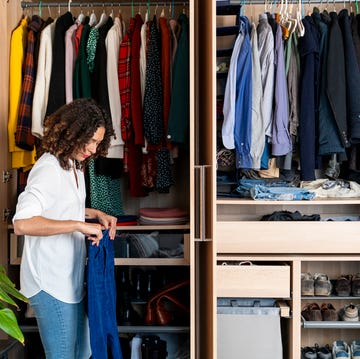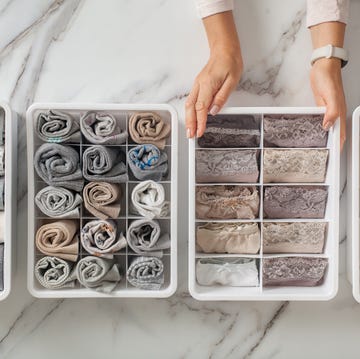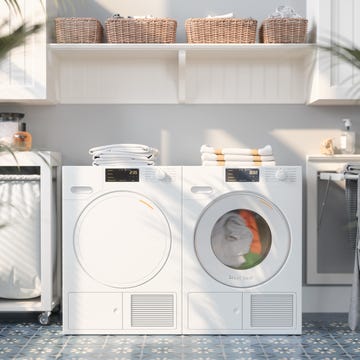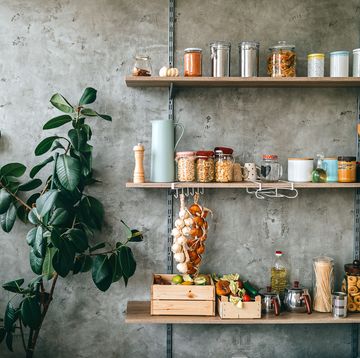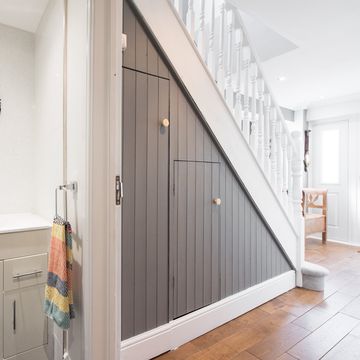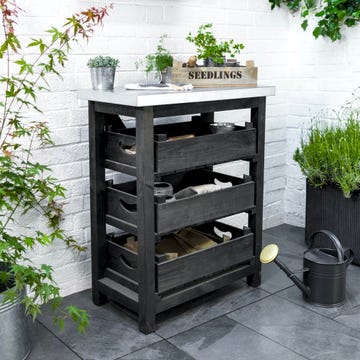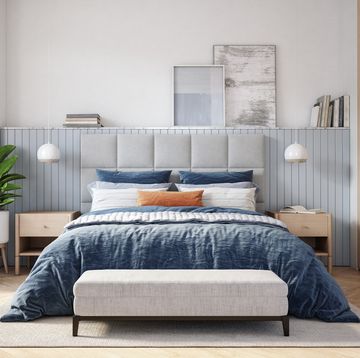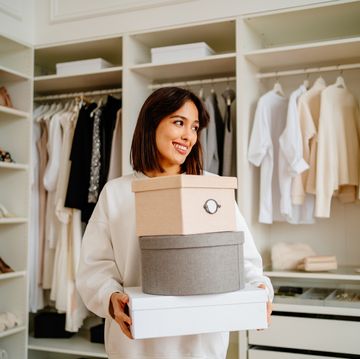It’s all well and good planning to declutter your home. But when it comes down to the day, you can end up feeling overwhelmed, unsure of where to start and like you’re making more of a mess. Biting off more than you can chew is a bad habit to break when decluttering, but it’s difficult not to when you’re decluttering such a large space.
That’s why we’ve teamed up with Vicky Silverthorn, professional organiser from You Need A Vicky to list the need-to-know hacks to make this task a little easier. We’ve rounded up the top decluttering tips to cover the kitchen, bathroom, bedroom, front room, hallway and home office, so you can clear some space without regret.
First steps
Before you begin, Vicky recommends getting a charity bag and having an initial clear out.
‘Walk around each room of your home with your new eyes on. I bet you can easily fill a bag. Make it your mission to fill at least one bag during a sweep of your home,’ she says.
Try not to look at what you’re collecting as rubbish, but as items that are no longer valued and can find a second life with someone else. However, you should avoid throwing things into the bag without a second thought. You need to take the time to consider each item as you declutter to avoid regrets – especially if they’re sentimental. Consider what the item means to you and whether it still has a purpose. It sounds like a lot of effort, but the more you do it, the easier it will become.
The decluttering expert also explains that it’s important not to move on to tasks in a new room until you've finished the one you started.
‘Be systematic. Work from room to room, one room at a time,’ says Vicky. ‘That’s the key.’
By decluttering room by room, the task feels more achievable and you can see your progress more quickly too. This also allows you to pause and easily pick up where you left off. The ski slope decluttering method by Anita Yokota, can help you sort through rooms systematically.
Make sure you’ve allowed enough time to declutter, too. If you’re dealing with a larger project, it might be worth breaking it down into smaller sessions across several days. If you intend to declutter in one go, make sure you’re taking breaks so you stay refreshed. Otherwise, you could be in danger of rushing things and not decluttering as effectively as you could.
6 decluttering jobs for your kitchen
- Go through your cupboards and throw out any food past its expiry date. Order the foods that remain by date, so those that expire soonest are at the front and they get used first. When you unpack food from the supermarket, keep this system in mind by placing new items at the back.
- Get rid of unused gadgets and appliances. Most charity shops are delighted to take electrical items but do check first. Alternatively, you may be able to sell these online or recycle them. Recycleyourelectricals.org.uk can guide you on what can be recycled and where.
- Cut out favourite recipes and store in plastic pockets.
- Banish plastic bags. Reusable bags will save you money and space, and are much greener. Extra plastic bags are usually recyclable. Check recyclenow.com for details.
- Stock-take your freezer and discard anything that’s been in there for more than three months. Remove cardboard packaging from your freezer to save space. Make sure everything is marked with what it is and when it was frozen, so everything gets used. Adopt the same back to front restocking method as used in your food cupboards.
- Consolidate! Group elastic bands, batteries and bin bags together so you know where to find them and when to buy more. Lidless Tupperware boxes are great make-shift containers for loose items such as these.
7 decluttering tips for your living area
- If you have children, teach them to put toys away at the end of the day. Consider repurposing existing furniture, such as a sideboard cupboard, to store them. Otherwise, have a look at stylish storage baskets with lids that can hide messy toys away.
- Research multi-use furniture, such as an ottoman that doubles as a fold-out mattress or a footstool that contains storage space.
- Sort through any piles of old magazines. Recycle those that have already been read or pass on to a friend.
- Sort through your books if they no longer fit in the bookcase. Declutter by category, e.g fiction, non-fiction, recipe books, study books etc, but save sentimental books for last. Donate, recycle or pass on those you’ve already read. For sentimental books you want to keep, make sure they’re not stored in direct sunlight to prevent damage.
- Keep surfaces as clear as possible so cleaning is quick, straight-forward and more likely to get done.
- Avoid keeping to-do or action piles in your living space, such as piles of receipts or work laptops. Keep the living room as a space for relaxation.
- A tray is a great way to give miscellaneous items, such as remote controls and glasses, a neat home.
7 decluttering tips for the bedroom
- Put out-of-season clothing into storage boxes or bags.
- If it doesn’t fit or you haven’t worn it in a year, give it away!
- Organise jewellery in a compartmentalised box or on a jewellery tree.
- Invest in some attractive baskets for storage. These can help to control a floordrobe!
- Divide and conquer with drawer compartments.
- Underbed storage is great for stashing out-of-season clothes. ‘I keep my holiday clothes in a separate drawer, ready to pack when needed,’ says Vicky.
- Use skinny, velvet hangers to gain extra space in your bedroom wardrobe.
3 decluttering tips for the bathroom
- Safely dispose of outdated medicines.
- Consider if you need those extra body creams and beauty supplies. Unwanted gifts can end up in this pile. If you’re not going to use them, find a new home for them.
- Check if products, such as creams and makeup, are still okay to use; many have a use-by date printed on the label. This illustration looks like a small open pot with a number within to guide on the number of months it will last after opening. Alternatively, best before dates can be printed next to a small hourglass symbol. The performance of the product can dwindle past this point, so stick to it and chuck anything away that’s past its best.
2 decluttering tips for your entryway
- Do not let shoes build up here, as tempting as it is. Have a dedicated space for the shoes you regularly wear and store the rest. Use a shoe rack to help organise your shoes and to keep every pair visible.
- Similarly, don’t let coats pile up on hooks near your front door. You can’t see or access those beneath and this can quickly turn into a mess. Have one coat hook per coat and rotate these as necessary.
2 decluttering tips for your office
- Make Post-it Notes a thing of the past by going digital. Whether it’s a web link, a screen shot, a photo or simply a note to self, use Evernote to store it all in one place. Download the app for free from your app store on to your phone, tablet or computer and create an account.
- Leave files behind and access documents wherever you are with Google Docs – a free word processing app. As documents are stored in Google Drive – a free online storage area – you can access them from any device that has the Google Docs app downloaded on to it. All you need is a Gmail account to get started.
7 decluttering jobs for right now
- Write down your goals: why do you want to get organised? What do you want to accomplish?
- Decide where your clutter is going to go. Charity shop? Recycling? Tip?
- Ask a friend to help – it’s easier to be objective about someone else’s things.
- Don’t buy organising supplies unless you’ve measured for it and really need it – otherwise, this is just another word for clutter.
- Take ‘before’ pictures of each room and work out what needs to be cleared.
- Switch to paperless post where possible and opt to receive bank statements electronically.
- Tell yourself, if you don’t love, wear or use it, it’s out.
‘Piles of stuff are the enemy!’ says Vicky. ‘Try not to let them get started but if they do develop, grit your teeth and sort them out – 10 minutes and it will be done.’
4 ways to keep up the good work
- Schedule a time each day for a routine tidy to your home to clear surfaces and floors.
- Be wary of the sales – clutter often comes with a reduced price tag.
- Keep a donation basket handy for unwanted items.
- Use the weekend to get organised for the week ahead: clear out and stock the fridge, wash bedlinen and plan meals so you’re not buying food daily.













